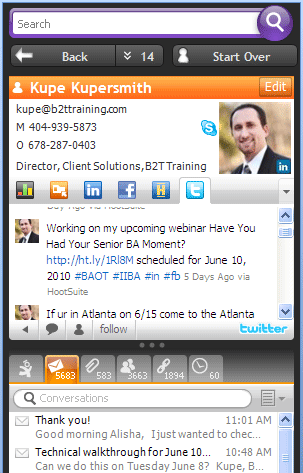 This is another follow-up to my blog post, The Six Key Characteristics of a Senior Business Analyst. Please take a minute to read that post so you understand the context of my comments on how to become a senior BA. Some of the readers, @SimonTheBA and @AWhittenberger, commented that it was great to know the characteristics of a senior BA, but were curious about my thoughts on how one becomes a senior BA. This post is good for those who want to become a senior BA or who are helping others become senior BAs. Please note my definition of what makes someone a senior business analyst may not align with the title “Senior Business Analyst” at the company you work at, or where you want to work. So, if your goal is to climb the company ladder make sure you look at what the company expects from you to grow. Even if my list of senior BA characteristics does not completely align with your company’s views, focusing on the steps I outline below will help you become a better BA and, therefore, become more promotable. It just so happens that my friends Laura Brandenburg and Adriana Beal recently published an eBook collection titled The Promotable Business Analyst. I recommend you”pick that up as it is a valuable resource.
This is another follow-up to my blog post, The Six Key Characteristics of a Senior Business Analyst. Please take a minute to read that post so you understand the context of my comments on how to become a senior BA. Some of the readers, @SimonTheBA and @AWhittenberger, commented that it was great to know the characteristics of a senior BA, but were curious about my thoughts on how one becomes a senior BA. This post is good for those who want to become a senior BA or who are helping others become senior BAs. Please note my definition of what makes someone a senior business analyst may not align with the title “Senior Business Analyst” at the company you work at, or where you want to work. So, if your goal is to climb the company ladder make sure you look at what the company expects from you to grow. Even if my list of senior BA characteristics does not completely align with your company’s views, focusing on the steps I outline below will help you become a better BA and, therefore, become more promotable. It just so happens that my friends Laura Brandenburg and Adriana Beal recently published an eBook collection titled The Promotable Business Analyst. I recommend you”pick that up as it is a valuable resource.
Find a Coach
One of things I see falling off company’s radars is providing coaching and support for employees. Many employees, especially junior BAs, are left to fend for themselves. In the past managers were coaches. Today I see more and more companies increase the ratio of employees to managers. This makes it difficult for the manager to focus enough coaching time with each employee. In the BA space there is another twist. Is the manager qualified to coach the BAs? The numbers are not there yet where BAs are becoming managers. Many BAs are managed by individuals in the IT arena, but may not have the BA skill set. In major league baseball, this would be like having an all-star third baseman become a pitching coach. They know the game, but don’t know all the mechanics of being a great pitcher.
In my last post, Four Ways to Best Utilize a Senior Business Analyst, I suggested senior BAs should be used as coaches for the junior analysts. If you have a coach great, if you don’t…get one. Just because one is not picked for you, does not mean you can’t find one or more. Don’t limit your search to your company either. Get involved in the many online communities like this one or your local IIBA chapter. Although many can’t be there with you day in and day out, you do have a support system of BAs at all levels willing to give feedback.
Be honest with your coach about the areas you feel you need to improve on. Come up with a plan to work on those areas. Be patient, you won’t become a senior BA overnight.
Don’t be Afraid to Fail
Now that you have a plan in place with your coach, start executing. This is easier said than done. To become a senior BA you need to have breadth and depth of knowledge and experience. You need to have experience with multiple project types and involvement in multiple business areas. The only way to get there is to take some chances. If you have a coach this is a little easier. You have someone to rely on and be your safety net. The best way to learn is by doing. And when you take action, failure is going to happen. Learn from that failure and move forward.
Be Persistent
You have to be willing to take chances. You also need your management to be willing to allow you to stretch beyond what you do well. Many of you will find risk adverse managers. Keep pushing to be given opportunities in new business areas, to try new techniques or to be part of a project that will meet your growth goals. Get creative! You may even have to offer to take on tasks on your own time. A client of mine just hired a person who had little to no BA experience. This person wanted to be a BA and worked every Saturday for months with my client, for free, to learn. Once a position opened up she was hired.
I had a senior BA moment because I was persistent. I wanted in on a project I heard about using some cool technology and in a new business area for me. I was denied access for six months. Every month I would ask about the status of the project and almost beg to be part of the team. I think my manager finally gave in because he wanted me to stop asking or just felt sorry for me. Whatever it takes. Right? I’ll admit I was nervous and a little unsure how I would perform since the business area was new and I did not know any of the stakeholders. I came out with flying colors and it helped my confidence level with future endeavors.
Instill a Feedback System
You need to be open to feedback to really grow. We do this for projects, why don’t do it for yourself. For projects we instill retrospectives to determine what went well, what didn’t and how the team can improve. You should set-up a feedback system for your improvement with those you work with. At intervals that make sense, ask for feedback on your elicitation techniques, your deliverables, etc.
Are the people you work with satisfied with your work? You may not know unless you ask. Here is a quick system you can put in place to continually get the feedback you need to improve.
- Ask for feedback. You may never get it if you don’t ask.
- Thank the person for their feedback. Don’t get defensive and try to explain why they are wrong.
- Implement the feedback into your work. Think through how you can take that feedback and make changes.
- Provide updates to the ones giving you feedback on how you have changed based on their feedback. This one is important. By updating people they know you are listening to them and they will continue to give feedback. One of my pet peeves is when people ask my opinion and never do anything with it or always do the opposite (maybe that’s a sign!). I tend to not freely give feedback to those people.
Remember this does not happen overnight. Keep building those skills and your confidence will grow. As your confidence grows you will begin to get closer to your goal. Before you know it you’ll be there.
Bu the way, I’m taking a little time off, so I might be slow responding to your comments. Please bear with me. Thanks.
Kupe
Don’t forget to leave your comments below
 Start with the art of the one-on-one encounter; add in strategies for interviewing, maximizing meetings and presentations; then finish off with making the most of social interactions. All together you get How to Wow: Proven Strategies for Presenting Your Ideas, Persuading Your Audience, and Perfecting Your Image, a resource to help you succeed in any situation. You can read the book cover to cover (like I did) or jump to the chapters that apply to you. With either approach it is one of those books you’ll keep in your library and reference for some time to come.
Start with the art of the one-on-one encounter; add in strategies for interviewing, maximizing meetings and presentations; then finish off with making the most of social interactions. All together you get How to Wow: Proven Strategies for Presenting Your Ideas, Persuading Your Audience, and Perfecting Your Image, a resource to help you succeed in any situation. You can read the book cover to cover (like I did) or jump to the chapters that apply to you. With either approach it is one of those books you’ll keep in your library and reference for some time to come.

 This is another follow-up to my blog post,
This is another follow-up to my blog post, 


